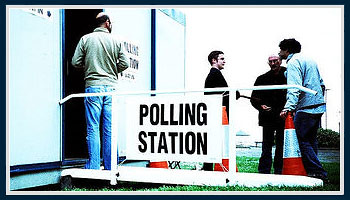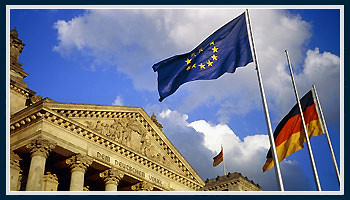From the invaluable UK Polling Report, we have the first UK voting intention figures for the 2009 European elections, released in today’s Sunday Telegraph.
The results, plus changes from the 2004 EU elections, are as follows:
Conservatives 35% (+8)
Labour 29% (+6)
Liberal Democrats 15% (+/-0)
UKIP 7% (-9)
Green 5% (-1)
British National Party 4% (-1)
Scottish National Party / Plaid Cwmru 4%
As UK Polling Report notes, “this would lead to the Conservatives winning 30 seats (up 3), Labour 24 (up 5), the Liberal Democrats 9 (down 2), the SNP and PC one each and UKIP 4 (down 8). The Greens would lose both their seats, while the BNP would fail to secure one.”
 Please note that the poll was carried out (between the 6th and 8th January) by a web-based polling organisation (YouGov) founded by a former Tory pollster, commissioned by the Tory eurosceptic campaign group Global Vision in partnership with the Tory-linked “small government” campaign group the Taxpayers’ Alliance – and the results were first published in the staunchly eurosceptic, Tory-leaning Telegraph. Whether this means that the questions were loaded and the results skewed is hard to tell, as I haven’t seen the full results or the questions asked. The sample was made up of 2,157 adults.
Please note that the poll was carried out (between the 6th and 8th January) by a web-based polling organisation (YouGov) founded by a former Tory pollster, commissioned by the Tory eurosceptic campaign group Global Vision in partnership with the Tory-linked “small government” campaign group the Taxpayers’ Alliance – and the results were first published in the staunchly eurosceptic, Tory-leaning Telegraph. Whether this means that the questions were loaded and the results skewed is hard to tell, as I haven’t seen the full results or the questions asked. The sample was made up of 2,157 adults.
It is also unclear whether a vote for newly launched pan-EU political party Libertas was an option – or how many people said that they would not be voting at all. Considering turn-out for EU elections in the UK has averaged about 30% in the last two, if the figures above are only based on those who will definitely be voting, the final sample size could be as few as 650 people (30% of 2,157) – statisticians will be able to tell you if that’s statistically significant for a UK population of 61 million. Either way, only 1% is unaccounted for in the above figures, and I very much doubt we’ll see a 99% turnout.
The dramatic drop in UKIP support (with further drops for fellow eurosceptic parties the Greens and the BNP) is one of the biggest points of interest. How to account for it? A pro-Tory bias in the questions from two Conservative-leading organisations conducting the poll, or a general collapse in UKIP support thanks to the party being, well, a bit rubbish? As Polling Report notes,
Back in 2004 YouGov included minor parties like UKIP in the main question prompt and, as a result, ended up over-stating the level of UKIP support – it will be interesting to see exactly how this question was prompted. Either way, how well UKIP will do is a hard one to predict. At the moment they get practically zero publicity in the mainstream media, so a huge drop in support is not a particular surprise. At the last European elections they received a lot of publicity because of Robert Kilroy-Silk, something that won’t be a factor this time… Accorded to the Sunday Telegraph report 10% of those who say they would vote Tory in a general election would vote UKIP in a European election, which implies that straight voting intention questions were also asked.
There were also some more general questions asked about the UK’s relationship with the EU which, as reported in the Telegraph, reveal the following:
16 per cent of voters want Britain simply to withdraw from the EU, while 48 per cent would like to see a much looser relationship, with the government taking back powers from Brussels and ending the supremacy of the European Court of Justice over British law.
Added together this makes 64 per cent in favour of weakening Britain’s ties with the EU, compared with just 22 per cent in favour of keeping the UK’s current full membership including the Lisbon Treaty, which was passed by parliament without a referendum.
Much worth noting there. The mention of “taking back powers from Brussels” (a key Tory promise under David Cameron, though it’s unclear quite how he could achieve this) would suggest a pro-Tory bias to the questioning. The mention of the European Court of Justice is also odd – this is an institution rarely explicitly brought up in the UK EU debate (in fact, it’s more often the non-EU European Court of Human Rights that is bandied about by press and politicians alike), though “the supremacy of European [law]” is a favourite buzz phrase of the eurosceptic right. Please also note the final part of that second paragraph: if “passed by parliament without a referendum” was included in the poll’s own questioning, that’s almost certainly going to result in some pretty hefty result-skewing, as by all accounts the British public was overwhelmingly in favour of a Lisbon Treaty referendum, while remaining overwhelmingly ignorant of its contents.
One final statistic of interest, from the Telegraph:
Some 45 per cent of voters, meanwhile, believe none of the three main political parties adequately reflects their views on Britain’s future relations with the EU
That sounds about right – and you can count me in among that 45%. As EU elections in the UK are based on a party list form of proportional representation, I will not have the option of voting for an individual candidate come June – which is what I usually base my vote on. Given the option of ONLY voting for a party, I find myself genuinely stumped. Indeed, it’s increasingly looking like the upcoming European elections will well be the first elections of any kind for which I have been eligible to vote at which I will reluctantly find myself abstaining.
Yes, you read that right: Despite being one of the most engaged and aware people in the British Isles when it comes to the EU – and arguably one of the most prominent and persistent online advocates for the UK’s continued involvement with the European integration – I may not bother to vote in the EU elections. That’s just about as damning an indictment of the way the EU currently works as you can get.

 The European Union emerged, as we all know, as a response to the Second World War. One of the earliest aims of the founding fathers was to prevent France and Germany from ever going to war again by integrating their economies so closely that to do so would become impossible.
The European Union emerged, as we all know, as a response to the Second World War. One of the earliest aims of the founding fathers was to prevent France and Germany from ever going to war again by integrating their economies so closely that to do so would become impossible. Please note that the poll was carried out (between the 6th and 8th January) by a web-based polling organisation (
Please note that the poll was carried out (between the 6th and 8th January) by a web-based polling organisation (